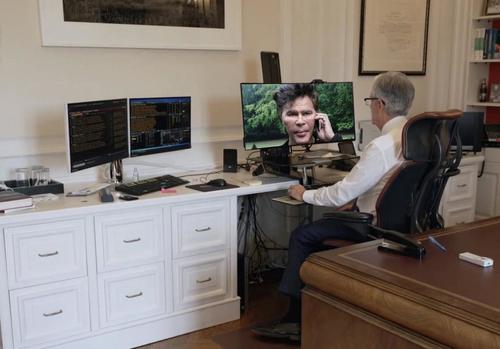TransitoRIP: “In Just A Few Days, The Market Was Treated With Two Big Shocks”
By Michael Every of Rabobank
TransitoRIP
In a matter of just a few days, the market has been treated with two big shocks. Last Friday, it was the omicron scare that got markets re-pricing the risks of more restrictions and hence a slowdown for the global economy. But yesterday it was Fed Chair Powell, who added fuel to the fire. In a testimony before the Senate Banking Committee he pledged to bury the term “transitory” and instead recommends Fed policy makers to consider explaining more clearly what the Fed thinks/means when it is talking about inflation. Or was Powell running out of dollar bills to put in the Atlanta Fed’s swear jar? We wonder if Powell now still owes Bostic a dollar for using the word while retiring it.
More importantly, a lot of folks will now surely be looking forward to know what the Fed really thinks! For example, did Powell mean to say that the effects of the temporary price rises will remain and not fade after a while? That would be more dovish than meaning inflation has reached a higher ‘plateau’.
As a corollary of the acknowledgment that inflation is, at least, not transitory, the Fed Chair suggested that it would be appropriate to “consider wrapping up the taper of our asset purchases, which we actually announced at the November meeting, perhaps a few months sooner.” That remark shook markets, after they were lulled into a bit of a slumber a day earlier, when Powell suggested that omicron posed downside risks to the Fed’s employment mandate, and more general uncertainty about the inflation outlook. Clearly, the Fed is now moving closer to an inflation fighting mode as it has become more concerned about inflation in recent months.
Does this mean that an accelerated taper is now all but a given? Or did Powell make a BoE-like faux pas, where it turns out in December that the FOMC does not want to follow through with this faster taper? The market surely seems to think the former. Does that then leave the risk that the Fed is embarking on a policy error by tightening into a potential economic slowdown?
Against the backdrop of a market that was still trading the omicron story one can imagine that there was suddenly a lot of sigma. EUR/USD fell almost 1 big figure on the back of Powell’s comments, but more noteworthy even was the strong risk-off reaction in asset markets, with US equity markets down nearly 2% and a flattening Treasury curve. 10y yields were down 5bp on the day, whilst the yield on the 2y note rose 5bp. In fact, the Treasury curve reached its flattest level since the onset of the pandemic. Concerns expressed by Moderna executives on the efficacy of the vaccine on the new strain may have played a role here as well, although a BioNTech co-founder said that shots may still be quite effective. Uncertainty remains high in any case.
Despite the change of tack at the Fed and elevated uncertainty, a broad based reaction in emerging market currencies failed to materialize. Indeed, some EM currencies actually performed well, such as India’s rupee, which has benefited from the decline in oil prices. Moreover, a good number of Asian economies have been reporting stronger manufacturing activity in PMI surveys (although China’s Caixin survey for November disappointed), which is seen as a sign that supply-bottlenecks have started to ease, albeit gradually. This obviously does not include the potential impact of the potential omicron wave.
The Turkish lira, though, is a whole different story. President Erdogan seems to be doubling down on his promise that rate cuts will bring rampant inflation to an end and thereby more stability in the currency. In an interview with TRT yesterday he also argued that the country needs to rid itself of “hot money” from foreign investors and that the country should not try to attract foreign funding. Market participants still think otherwise and have sent the Turkish lira into a tail-spin. Yesterday TRY lost another 5% against the dollar, potentially aggravating the inflation situation, which is already running at four times the official target of 5%. What is interesting, though, is that the country’s current account balance (and FX reserves) have been steadily improving since early 2020. Not fighting inflation does appear to have boosted the country’s competitive position. But the ultimate cost of its policy choices could be significant.
Talking about inflation, the Eurozone preliminary estimate jumped by a hefty 0.8%-points to 4.9%, making this one of the biggest upside surprises in recent history. And – for good measure – this is also more than twice the central bank’s long-term target. The core estimate rose by no less than 0.6%-points. Consensus was far off in both cases, although German data – released the other day, had already given market participants a pre-warning. The biggest single contributor was, unsurprisingly, energy, with a 0.4%-points contribution to that 0.8%. October and November were the months where the gas and electricity price hikes really kicked in. However, services provided another 0.24%-points, although the data from Germany had already indicated that the recreation and culture sector – which can be very volatile due to seasonal effects – was probably the main culprit. Food and non-energy industrial goods both added 0.1%-points. In other words, this was a fairly broad-based increase in prices. Full stop.
Will this challenge the ECB’s ‘transitory’ story as well come the December meeting? We still expect the Council to hold on to this line of reasoning, but even the Bank of Japan may be throwing in the towel.
Tyler Durden
Wed, 12/01/2021 – 10:45
via ZeroHedge News https://ift.tt/3d7Zhsv Tyler Durden
